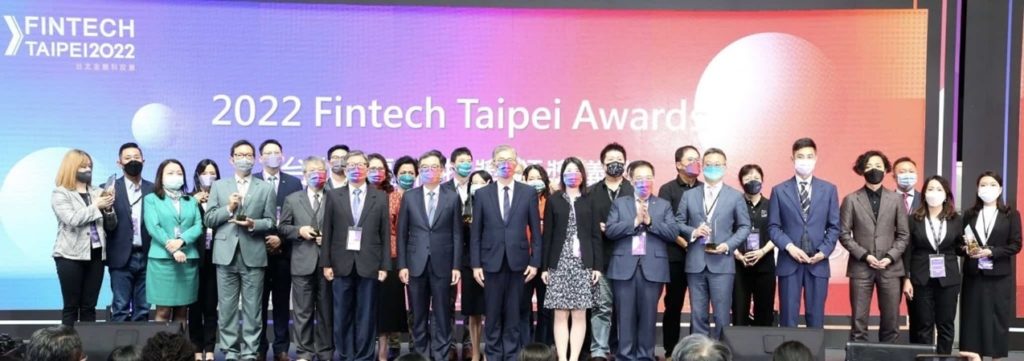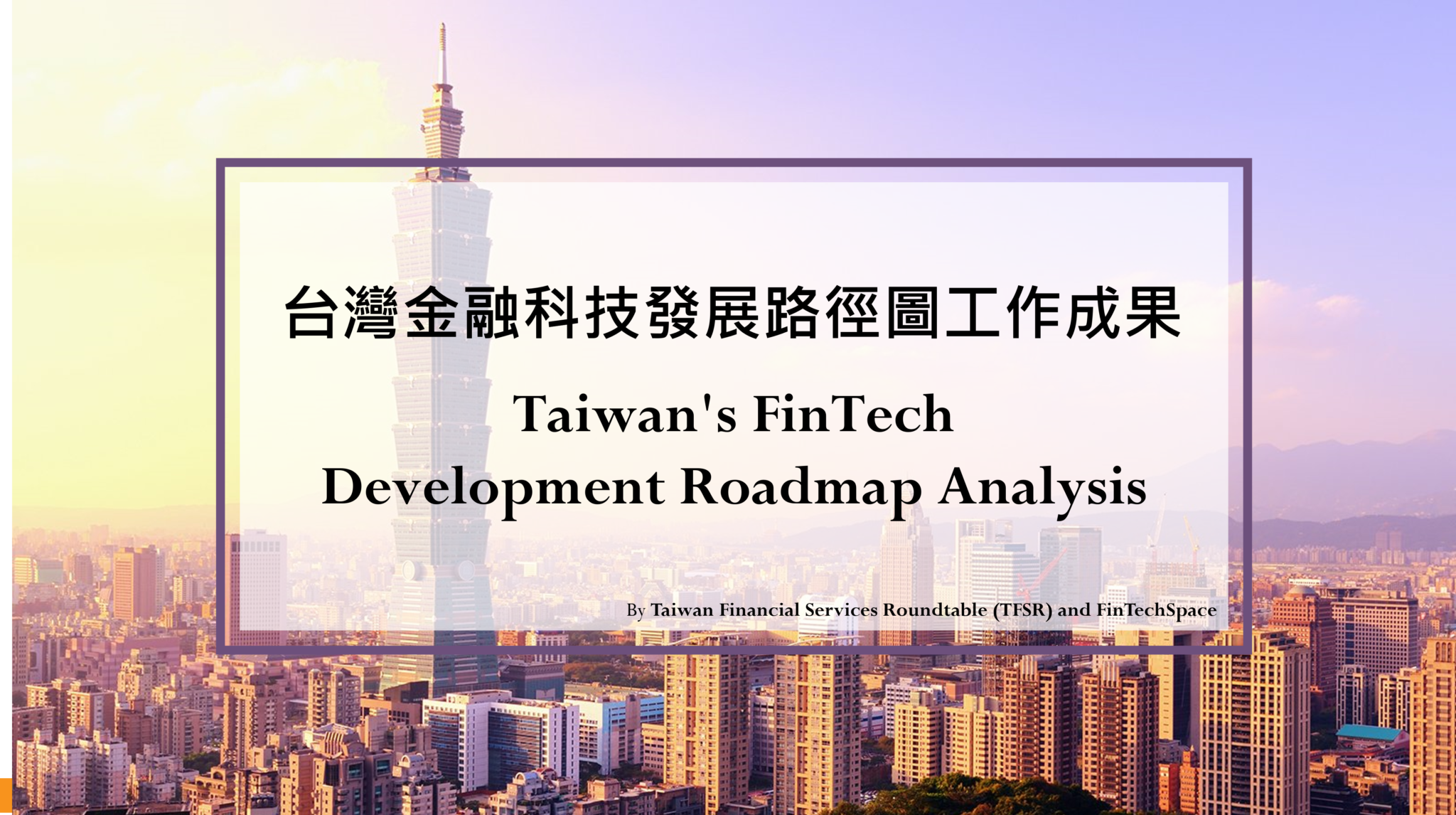Taiwan’s FinTech Development Roadmap Analysis
By Taiwan Financial Services Roundtable (TFSR) and FinTechSpace
Under the active promotion of the Financial Supervisory Commission (FSC), the FinTech Development Roadmap of Taiwan has been released to the public since August 27, 2020, with four major objectives: Inclusion, Innovation, Resilience, and Sustainability, and four major groups, including the Capacity Building Group, Data Governance Group, RegTech Group, and Publicity & Exchange Group, have been set up for the step-by-step advancement and active development of FinTech, and after these years of efforts, there are some achievements to show to the world.
Highlights of the RegTech Group
- Supervision Technology – Digital Supervisory Reporting Mechanism for Bills Finance Companies
According to the financial technology development roadmap, the RegTech Group promotes the digital supervisory reporting mechanism for internet-only banks (short-term), bills finance companies (medium-term), and banks (long-term) in stages. The FSC entrusted the Taiwan Depository & Clearing Corporation to set up a digital supervisory reporting mechanism for bills finance companies, which was officially launched in 2021, and was implemented in parallel with the single reporting mechanism, which is a big step forward for the development of digital supervisory technology in Taiwan.The digital supervisory reporting mechanism consists of two platforms: the Digital Supervisory Reporting System and the Supervisory Analysis Portal. The reporting system uses API technology and introduces automated data verification functions to verify the accuracy of data in real time, improve the efficiency of reporting and optimize the quality of reporting for bills finance companies. The Supervisory Analysis Portal not only connects to the granular data of bill settlement and delivery of TDCC, credit of the Joint Credit Information Center (JCIC) and bonds of Taipei Exchange, but also connects to the single reporting window of the Financial Examination Bureau (FEB) of the FSC and the shared platform of the Banking Bureau. With the use of visualized dashboard technology, the supervisory authority can use interactive multi-dimensional supervisory analysis tools to fully present critical supervisory information, manage market dynamics in real time with big data, and establish real-time alert notifications for important financial business risk indicators to accurately identify the risk status of individual bills finance companies and enhance supervisory efficiency.
Continuing to research and introduce AI technology, using the diversified scenarios of supervision to identify correlations from multi-dimensional data, making it easier to track financial activities, effectively reducing the degree of impact of potential risks, creating new value in supervisory technology, and further assisting the competent authorities to create a sound FinTech environment.
- Regulatory Adaptation and Ethical Regulation – Diversified Digital Identity Authentication Mechanism
With the rapid development of digital financial services, the related business model has broken through the traditional framework of institution-based supervision in the financial industry, and therefore the feasibility of a single cross-sector management regulation needs to be studied. The RegTech Group was formed by the competent authorities, financial associations such as the Bankers Association, and various peripheral entities to review the existing digital laws and self-regulatory regulations in accordance with the “Regulatory Adaptation and Ethical Regulation” promotion measures in the FinTech Development Roadmap, and after discussion, selected the topic of “Diversified Digital Identity Authentication Mechanisms (including Electronic Signature)” and commissioned the Center for Financial Technology Research Center (FTRC) at National Chengchi University to conduct the research.After a year’s effort, the research team consolidated the risks or problems related to identification and authentication in the domestic financial industry, and collected international legal and practical cases worthy of reference, and successfully completed the research report in September 2022, making recommendations on policies and regulations, industry promotion, and industry application respectively.

figure 1:
TDCC Suptech Platform-The FSC Financial Examination Bureau gathered the Department of Financial Inspection under the Central Bank of the Republic of China (Taiwan), FSC Banking Bureau, other related departments and bureaus, related financial institutions, and the TDCC to form a task force for the SupTech Platform.
Highlights of the Data Governance Group
“The Data Governance Group”, convened by the JCIC, is responsible for assisting the FSC in promoting cross-institutional and cross-market data sharing issues in the financial market under the FinTech Development Roadmap and promoting a standardized mechanism for financial mobile identity authentication.
Up to now, the achievements in the cross-institutional and cross-market data sharing issues in the financial market include:
- In order to strengthen the information disclosure of third-party service providers (TSPs) participating in the open banking business, the “TSP Information Disclosure Section” was set up with the assistance of FISC and was officially launched in July 2021. At present, the Section has provided information on seven TSP companies.
- On December 23, 2021, the FSC issued the “Guidelines on Data Sharing among Financial Institutions”, which are applicable to three categories including financial holding company (FHC) groups, non- FHC financial groups, and financial institutions that do not belong to the above two categories, to clearly reveal the data sharing mechanism among financial institutions, in order to enhance consumer rights and interests. It also promotes the legal and reasonable use of customer data under the principle of information security, and enhances the convenience of customer transactions and the efficiency of data use by financial institutions.
- On March 31, 2022, JCIC launched the “Application of JCIC Data by FinTech Industry” service, which provides encryption and decryption services to eligible FinTech industry players based on the online credit report access service for individuals, allowing them to transfer their credit score information to FinTech industry players in a more convenient and secure manner according to their own wishes. This service is conducive to promoting the rational use of personal information, enhancing consumer’s financial service experience and realizing financial inclusion. Currently four FinTech companies have applied for the service.
In addition, in order to promote the standardization of mobile identity authentication mechanism for financial services, the “Financial FIDO Alliance” was established on May 4, 2021, and 133 organizations have participated since its inception to jointly promote the introduction of the FIDO (Fast IDentity Online) mechanism, and has completed the development of the ATM card identity verification system, the development of technical specifications, and the business items and services that can be applied. After the launch of the “Digital Identity Authentication and Authorization” thematic regulatory sandbox and business trials, there have been more than 10 proposals involving the use of FIDO mechanisms, including the application of online account opening, registration, access to online banking and personal information changes.


figure 2:
The “TSP Information Disclosure Section” was set up with the assistance of FISC.
Highlights of the Capacity Building Group
- FinTech Competency Certification Mechanism
In view of the critical role of talents in the process of digital transformation of financial institutions, the “FinTech Competency Certification Mechanism” is specially established and promoted. The six major categories of competencies closely related to FinTech include Business Analysis, UI/UX, Data Analysis, Digital Product Design, Compliance Technology and Digital Marketing, and the corresponding professional subjects are designed according to the functions required by each profession in the industries of banking, insurance, securities, futures, and investment trust and investment consulting. This mechanism is based on a combination of training and examinations, and those who wish to obtain the certification will first attend a professional subject training course, which focus on both theory and practice, with concrete cases and hands-on exercises, and are combined with post-course examinations. The implementation of this mechanism should achieve the following two results: first, to provide entry standards for financial institutions to hire technology talents, and to provide reference career path for existing financial industry professionals to develop their second expertise in FinTech; second, to establish a financial technology talent pool, and to train and prepare FinTech talents both in quantity and quality for the financial industry.
- Host the FinTech Taipei Awards
In order to encourage the various roles covered by the financial ecosystem to function and promote the innovation and progress of financial technology, the first nationwide financial technology competition in Taiwan, “FinTech Taipei Awards 2022”, was held to gather the energy of the industry. A total of 99 organizations and 162 submissions competed for five categories, including the “Technology Innovation Award”, “Business Model Innovation Award”, “Co-creation Model Award”, “Rising Star Award”, and “FinTech Investment Award”. 15 winning teams were selected to receive awards at the FinTech Taipei 2022, and were awarded a one-year stay at the FinTechSpace (commissioned by the FSC and operated by the Institute for Information Industry (III), as well as access to counseling resources worth NT$1 million.


figure 3:
The 15 winning teams of the FinTech Taipei Awards were awarded at FinTech Taipei 2022.
Highlights of the Publicity & Exchange Group
With the FinTechSpace (Taiwan Financial Service Roundtable) as the convener, the group organizes financial technology seminars, international publicity and promotional activities, assists financial institutions to expand overseas markets, links to overseas resources and other financial technology advocacy activities, and achieves the following short-term goals:
- Promoting international exchanges: As of the end of 2022, we have cooperated with the British Office in Taiwan (August 12, 2021), the Israeli Economic and Trade Office in Taiwan (October 6, 2021), the Canadian Trade Office in Taipei (October 27, 2021), the Czech Economic and Cultural Office (April 11, 2022), the Polish Investment and Trade Office in Taipei (August 3, 2022), and the Australian Office (August 9, 2022) and co-hosted a total of six online FinTech seminars, inviting experts, accelerators and start-ups from different countries to share the current status of development of specific topics of FinTech in different countries, not only to enhance bilateral exchanges, but also to strengthen the international communities’ understanding of Taiwan’s industrial development and to bring them to the FinTechSpace; at the same time, introducing the international development results of FinTech and the current status of industry regulation, which helps domestic financial industries to keep abreast of the international trends.
- International publicity and promotion: In 2011, we have completed two advertorials on FinTech for Australian Office (“Australian FinTech Ranks 6th in the World in 2021”) and the UK Office in Taiwan (“UK Experience Helps Taiwan Develop FinTech Industry”) and published in the December issue of Taiwan Banker magazine to help introduce and promote these two countries’ FinTech development. We also collaborate with relevant institutions to publish online articles regarding the development of financial technology in Taiwan, and will keep looking forward to further international exchanges and cooperation.
- International market expansion: The three winning teams for the above mentioned ” Rising Star Award” of 2022 FinTech Taipei Awards are formed as International Teams, and depending on the target markets applied by the winning teams, the FinTechSpace will provide counseling to the teams by cooperating with local accelerators, our foreign offices, and the FinTechSpace’s legal team and linking local resources to first understand the needs of the teams in the countries they wish to develop, and provide foreign legal and regulatory consultation, international regulatory counseling, international market orientation counseling, and travel subsidies for international exhibitions to help the international teams to accelerate their overseas market development and establish world-class innovation services.


figure 4:
FinTechSpace and the British Office Taipei (DIT) organized a fintech webinar featuring experts from Taiwan and the UK to share their experiences in their respective markets.
Furthermore, for the purposes of demonstrating how FinTech affects the lives of financial consumers, creating business opportunities, attracting venture capital and talents for financial service providers, and keeping abreast of the global trends in FinTech development, the FSC has cooperated with TFSR and Taiwan Academy of Banking and Finance to hold FinTech Taipei Exhibition/Forum since 2018. This year’s Exhibition (FinTech Taipei 2022) was held on October 28 and 29. There were 159 exhibitors and a total of 379 booths, 57 domestic and foreign firms from 19 countries participated. Lectures and seminars by experts from the government, academia and research institutes have attracted more than 35,000 people.

